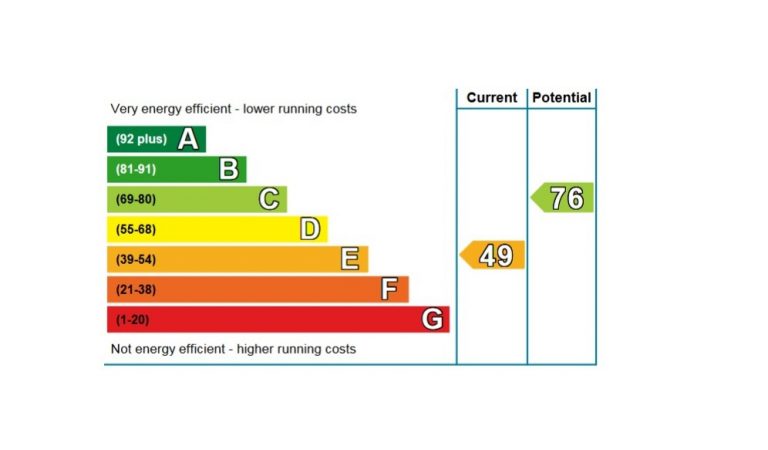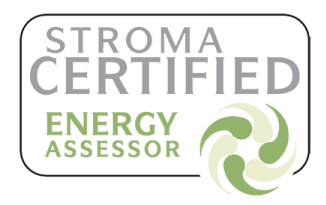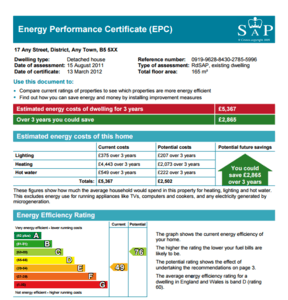London EPC and Gas Safety Certificates for Smooth
Sales, Rentals and Legal Peace of Mind
If you are a landlord or property owner in London and need to understand and arrange an EPC assessment, look no further. SLEPC have been providing Energy Performance Certificates across London for many years. Let us explain exactly what an EPC is and the process required to get one.
London EPC’s, or Energy Performance Certificates, are required by law for the Sale and Let of properties. You can see an example Certificate above, this is the standard template all EPCs follow. For Landlords, New Minimum Energy Efficiency Standards (MEES) legislation has meant that from April 2018 you can’t let a property with less than an E Rating. There is an aim to increasing the requirement to a C Rating in the coming years.
For homeowners looking to sell in London the Energy Assessment is an advisory tool, indicating how much a property may cost to run and how it can be improved. The report also highlights any changes you have made to your property since it was last checked and can add value to prospective buyers.
For commercial property owners, obtaining a commercial energy performance certificate is essential for attracting potential buyers and making informed decisions about energy efficiency in non-domestic properties. The assessment process, the validity period of the certificate, and the implications for energy improvements and costs are crucial factors to consider.
What is an Energy Performance Certificate (EPC)?
An Energy Performance Certificate (EPC) is an important document that provides detailed information on the energy efficiency, or estimated running costs, of a building. Whether you own a residential or commercial property, an EPC is a mandatory requirement in the UK fopr Sale or Let. This certificate helps compare the energy efficiency of different properties, making it easier for potential buyers or tenants to make informed decisions, with minimum requirements in place for rental accommodation. The EPC is calculated based on various factors which we assess as part of a site visit and it is rated on a scale from A (most efficient) to G (least efficient). By understanding your property’s EPC rating, you can identify areas for improvement and take steps to enhance its energy performance, reducing energy costs.
Benefits of an Energy Performance Certificate
The output of the Energy Performance Certificate (EPC) can be beneficial for property owners. Firstly, it can significantly increase your property’s energy efficiency and lower costs by identifying areas where energy consumption can be reduced through improving certain elements. This may not only lead to lower energy bills but also help reduce your carbon footprint. Secondly, a better EPC rating can increase the value of your property, making it more attractive to potential buyers or tenants when comparing similar properties. Compliance with EPC regulations is also essential for Landlords where minimum requirements and penalties may be in place. Moreover, demonstrating a commitment to energy efficiency can enhance your reputation, appealing to environmentally conscious tenants or buyers. Overall, we believe an EPC is a valuable tool for any property owner.
Who needs an Energy Performance Certificate?
As a landlord, or property owner, it is important to have a valid Energy Performance Certificate in place before you rent or sell a property to prospective buyers/tenants. This is not only a legal requirement, but property sites such as Zoopla also refer to Energy Performance Certificates as part of their data collection to give indicative valuations.
Energy Certificates are easy to read, displaying the rating on a scale from A to G. If your property has an A Rating then this will be the most affordable to run and more energy efficient. If the property attracts a G Rating it will be expensive to run and may require updating before being lived in.
The EPC has recommendations on it which indicate a cost for implementing and an idea of how much they may save over a year on bills. If you need to achieve a C Rating and are unsure, maybe we can help, visit our service page for further info on achieving a C Rating.
Read on for more information about the process and how we can help. If you want to find out about an existing Certificate, follow this link for more information on the Government’s EPC Register. It’s worth noting that Domestic EPCs are valid for 10 years, after which another Energy Assessment will have to be undertaken.
EPCs in a nutshell
An EPC certificate indicates the energy efficiency of a property based on how expensive it is to light and heat.
It considers various factors such as:
- Size of property – How much space do you Heat and Light?
- Fabric for the Building – How good is it at keeping in the Energy you use?
- Method of heating – Gas Boiler/Electric Heating?
The energy efficiency of a property is shown through a rating system from A to G. An ‘A’ rated property is very efficient and the cheapest to heat. A ‘G’ rated property will be very expensive to heat due to things like solid brick walls, no fixed heating solution and no insulation.
What is the process to get an EPC Certificate in London?
The Certificate must be produced by a member of an approved Government Scheme (we are members of all the main bodies including Elmhurst and Quidos), they are known as Domestic Energy Assessors (DEA’s).
Our Energy Assessor will visit your property and take measurements, floor plans and photographs of all of the elements involved. This includes Heating and Lighting Systems, Glazing, Insulation and Buidling construction. Following the energy assessment visit they will use approved software to model the building efficiency utilising the Reduced Standard Assessment Procedure, or RDSAP for short. This will calculate the efficiency of your property and where improvements can be made based on heat loss calculations for each element. Ultimately the report will indicate an estimated cost of running your property and where potential savings could be made.
It is important to note that rental properties must meet a minimum EPC rating of at least E for both new and existing tenancies, as per legal requirements, watch this space as the government may potentially raise this requirement to a C Rating for all rented properties.
The output of this visit is your Energy Performance Certificate, the report is lodged on the government register and is then publicly available. The Certificate then exists online and is publically available. This can be access via the link we share with you.
What to expect during an EPC site visit
During the EPC site visit a qualified energy assessor will conduct a thorough assessment of your building’s energy efficiency. The process typically involves a visual inspection of the property to investigate the building’s fabric, including walls, floors, and roofs. The assessor will also examine the heating, cooling, and ventilation systems to understand how energy is used within the property. Measurements of the building’s dimensions and layout will be taken to work out the living space being heating and lit by the systems in place. Using specialised software, the assessor will then calculate the building’s energy efficiency and produce an EPC report. This comprehensive assessment ensures that you receive an accurate and detailed evaluation of your property’s energy performance.

The EPC Report
As discussed, EPC rating is based on a scale of A-G, as displayed above, with A being the best rating and G the lowest. (‘A’ ratings are usually only achievable by super insulated properties with renewables). This means that home owners and occupiers can compare the energy efficiency of different properties in a similar way to comparing the energy performance of fridges or freezers.
As a rule of thumb the average rating for a UK property is around 60, or a Mid ‘D’ Rating, unfortunately we lag behind many European countries in this area. Most properties can get to a C rating without having to implement massive improvements, with gains coming from updating insulation, heating systems and glazing (although this can be very expensive). We can also advise on this as necessary, especially as Landlords face a potential mandatory requirement to maintain properties to a C rating.
The Energy Performance Certificate EPC includes a recommendation section which lists the potential improvements that can be made to a property in order to:
- Cut fuel bills
- Improve energy efficiency
- Help cut carbon emissions
There are four main sections in the report:
1. Energy Efficiency rating and potential savings
2. A summary of energy performance features
3. The recommendations for improving the energy efficiency
4. Details of the properties environmental impact
Most properties in London have an EPC now, you can click on the following link to check the register of all lodged EPCs on the government site. This is useful as you will see nearly all London properties on there and can check any property for free, compare with your neighbour, or even check the rating of a property you may be looking to purchase.
Energy Performance Certificates arent without their limitations however, as this article in the Guardian from 2024 discusses EPCs and their pitfalls
How much does a London EPC cost and how do you pay?
Costs vary massively between providers, we’ve heard of agents charging £270 (and then paying us £80!). Some providers have a low initial fee advertised and then add on additional room costs when you come to book, we prefer to keep things simple and charge a flat fee of £80 this can be paid by cash on the day or bank transfer on invoice, at which point your EPC will have already been lodged on the gov.uk register. We never charge for our services up front.
Consequences of not having an EPC
An EPC is required to be in place for the Let or Sale of any Domestic property. If a rental property does not have an EPC, or the EPC is below an E Rating, it will be flagged as not able to be let on the EPC Register. If an Energy Performance Certificate isnt in place for the sale of a domestic or commercial property, then it will not be able to be progressed by the agents/solicitors. For Commerical properties one of the most immediate repercussions is the potential for fines and penalties, which can be as high as £5,000. Additionally, without a valid Domestic EPC demonstrating the property wont attract massive energy bills, you may struggle to attract tenants or buyers. It is important to ensure that your property has a valid EPC to avoid these negative outcomes and maintain a positive standing in the market.
Why use SLEPC?
Based in London (Croydon), as your local EPC Providers covering South London, we realise the Sale and Let of properties can be very stressful, so we try to offer a service which is convenient and reliable and we don’t charge a penny until you have the completed Certificate. Give us a call, or just fill in your details on the form and we’ll be in touch. Need to get a Gas Safety Certificate too, then check out our Gas Safety Certificate page.
Commercial Property EPC
Whether you have a residential or commercial property, a report is required. Commercial buildings require their own reports via an energy assessment visit that can only be conducted by a Commercial Energy Assessor. Please contact us directly for more information on this process as costings are directly linked to the size of the commercial building. Commercial EPCs in London require a longer site visit and more detailed calculation so are by their nature more expensive than Domestic EPCs
Exemptions from EPC requirements
While most commercial properties require an Energy Performance Certificate (EPC), there are some exemptions to this rule. For instance, temporary buildings with a planned time of use of two years or less do not need an EPC. Similarly, buildings that do not use energy for space or water heating are exempt. Other exemptions include buildings with a total useful floor area of less than 50m² and industrial sites with low energy demand. Additionally, buildings that are intended to be demolished are not required to have an EPC. However, these exemptions are subject to change, so it is advisable to consult with a qualified energy assessor to determine if your property is exempt from EPC requirements




